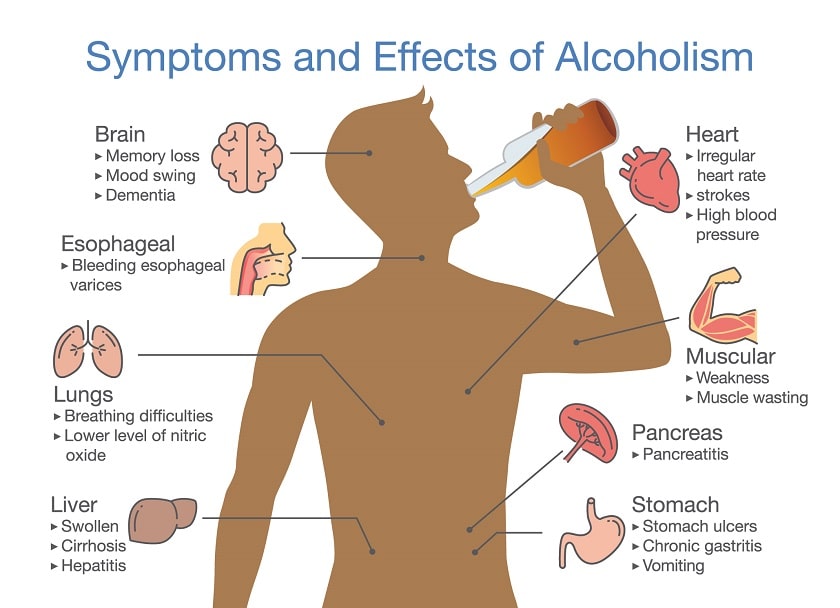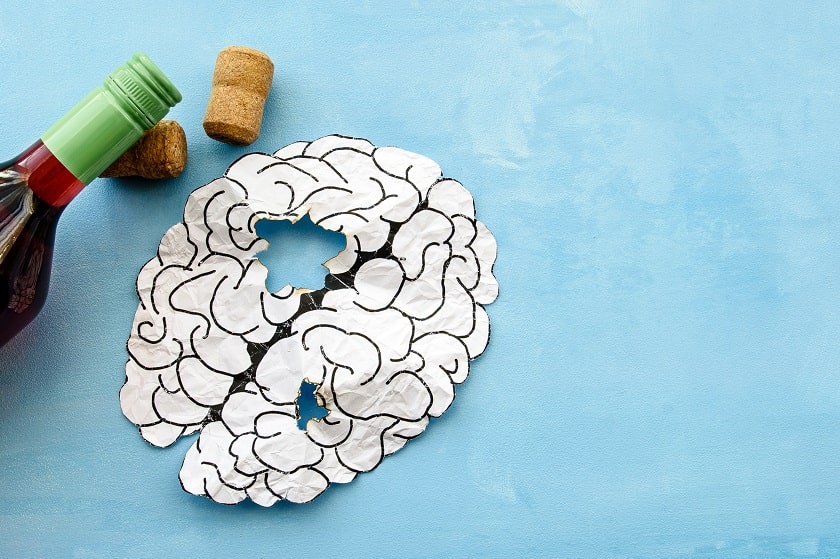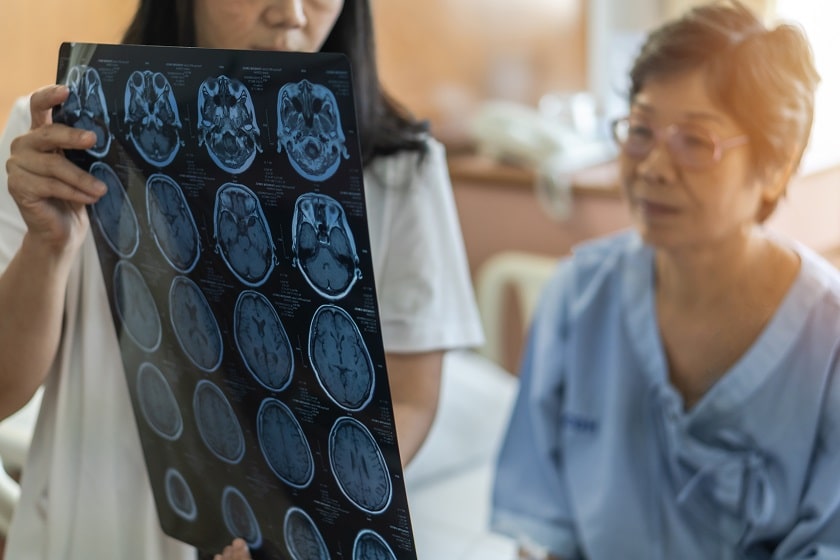
Alcohol and Dementia: Alcohol Induced Dementia
Did you know that more than 200 diseases and injuries are associated with alcohol use? The harmful use of alcohol causes 3 million deaths every year, which is 5.3% of all deaths. Even worse, recent research has shown the adverse effects of excessive alcohol consumption on both short- and long-term health, including brain damage, which may lead to Alzheimer’s disease and other forms of dementia. Read on to learn more about alcohol related dementia.
Contents
Harmful Effects of Alcohol

Alcohol is a psychoactive substance with dependence-producing properties that has been widely used in many cultures for centuries. There is a high burden of disease caused by alcohol abuse and significant economic and social consequences. The consumption of alcohol is harmful not only to your brain but also to your short and long-term health.
Short-Term Health Risks
The immediate effects of excessive alcohol consumption can lead to many severe health conditions. As a result of binge drinking, you may experience the following:
- Injuries include motor vehicle crashes, falls, drownings, and burns.
- Intimate partner violence, homicide, suicide, and sexual assault.
- Alcohol poisoning
- Women’s risk of miscarriage, stillbirth, and fetal alcohol spectrum disorders during pregnancy
Long-Term Health Risks
Excessive alcohol use over time can cause chronic disease and other serious problems, including:
- Hypertension, heart disease, stroke, liver disease, as well as digestive problems.
- All cancers, including the breast, mouth, throat, voice box, liver, colon, and rectum.
- A weakening immune system makes you more susceptible to illness.
- Learning and memory problems, including alcohol related dementia and poor school performance.
- Anxiety and depression, as well as other mental health issues.
- Alcohol use disorders or alcohol dependence.
Alcohol and Brain Damage

A long-term intake of alcohol can lead to brain damage. Those who drink heavily over a long period are more likely to have a smaller volume of white matter in the brain, which is responsible for transmitting signals. As a result, there can be issues with how the brain functions. The long-term consumption of alcohol may also lead to low levels of vitamin thiamine B1, memory disorders and alcohol related dementia.
Alcohol Related Dementia
Alcohol related dementia is a form of dementia associated with excessive alcohol consumption. As it affects memory and cognitive ability, it is similar to Alzheimer’s disease.
Similarly, alcohol related dementia affects memory, learning and other mental functions. Korsakoff’s syndrome and Wernicke-Korsakoff syndrome are particular forms of alcohol related brain injury.
What Are the Symptoms?
Individual symptoms vary but usually include the following:
- Having difficulty learning new things
- Personality changes
- Memory problems
- An inability to think clearly and logically about tasks that require planning, organization, common sense judgement and social skills
- Balance problems
Who Gets Alcohol Related Dementia?
Those who drink excessive alcohol over a long period may develop these conditions, but the vast majority do not. There is no clear explanation for why some heavy drinkers develop dementia or Wernicke-Korsakoff syndrome while others do not. Diet and lifestyle factors may be involved. Typically, these conditions affect men over 45 with a long history of alcohol abuse, although they can also affect women.
What Does the Evidence Say?

Several research studies have been reviewed by Alzheimer’s Disease International and the National Institute for Health and Care Excellence (NICE) regarding the relationship between alcohol consumption and dementia.
The studies evaluated by NICE looked at large populations of hundreds or even thousands of people, tracking them for over five years and sometimes well into old age to assess how long-term behavioural patterns impact dementia risk.
In these reviews, researchers found that individuals who drank heavily or binge consumed a large amount of alcohol within a short period were more likely to develop Alzheimer’s disease or alcohol related dementia than those who consumed moderate amounts of alcohol.
Can You Get Better from Alcohol Related Dementia?
Alcohol related dementia, in contrast to Alzheimer’s and vascular dementia, is not sure to worsen over time. People can often improve or stop getting worse if they stop drinking alcohol, take high doses of thiamine, and eat a balanced diet. However, alcohol related dementia will likely worsen if the person continues to drink alcohol and does not eat well.
The process of helping someone with alcohol addiction to stop drinking can be challenging. If the person has alcohol related dementia, it can be even more challenging. When a person has dementia, they may not understand that they should stop drinking. It may also be difficult for them to stay motivated if they stop drinking since losing motivation is a symptom of dementia.
Moderate Drinking and Dementia

According to a new study, moderate alcohol consumption is associated with lower levels of beta-amyloid, the protein that forms Alzheimer’s disease brain plaques. The study involved 414 men and women, with an average age of 71, who were free of dementia or alcohol related disorders. All underwent physical exams, tests of mental acuity, and brain scans. A thorough interview was conducted regarding their drinking habits.
Researchers measured drinks in “standard drinks,” such as 12-ounce beers, 5-ounce wines, or 1-and-a-half-ounce liquors. The rate of beta-amyloid deposits in the brains of those who drank one to 13 standard drinks a week was 66 percent lower than that of abstainers. Researchers restricted their study to people who have consumed moderate amounts of alcohol for decades rather than people who have recently begun drinking moderately or drink more than 13 drinks a week.
Dr. Dong Young Lee, the senior author and professor, pointed out that this was an observational study, not a cause-and-effect study.
Still, he said, “moderate drinking appears to be beneficial to brain health in people without dementia and without alcohol abuse or dependency.”
Quick Tips to Stop Drinking Alcohol

1. Start with a plan
2. Know your why
3. Know your triggers
4. Limit your exposure to alcohol
5. Practice self-care
6. Engage in new activities to replace alcohol
7. Reward yourself for success
8. Don’t give up!
Final Words
No matter how long you’ve had a drinking problem, now is the best time to quit. You can reverse some alcohol related brain damage by quitting alcohol, preventing premature death, and reducing the risk of further damage.
When it comes to alcoholism, there is no such thing as a personal failure. The right combination of mental health support, including therapy, is also essential for quitting drinking. Avoiding people and places that trigger drinking would be best since the right environment can make a big difference.
I remember a close family member who struggled with alcoholism for many years and eventually developed dementia. It was heart-wrenching to see the toll that this disease took on their mental and physical health and our family as a whole.
I think it’s essential to raise awareness about the connection between alcohol and dementia, as it’s a topic that is often overlooked or ignored. While many people may be aware of the risks associated with heavy drinking, fewer may realize that alcohol abuse can lead to long-term brain damage and cognitive decline.
I found this article informative and thought-provoking, as it touches on a topic that is often overlooked in discussions of dementia.
Prolonged alcohol abuse can lead to alcohol-induced dementia, impairing memory, cognitive function, and overall brain health.